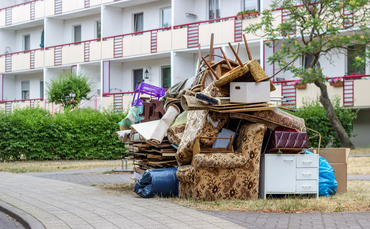Leading furniture retailers have teamed up on a new circularity initiative focused on encouraging reuse of the tables, sofas, and beds that too often end up in landfill well before the end of their usable life.
The new Circular Change Council, announced by eBay UK and waste charity WRAP this morning, is aiming to tackle common barriers to the uptake of second-hand furniture.
IKEA, Sainsbury’s, Dunelm, industry group the British Retail Consortium, and charity British Heart Foundation have all joined the group, which has pledged to “frame ‘non-new’ furniture in the most appealing way to help tackle common perceptual barriers.”
Kumaran Adithyan, general manager for home, refurbished, and electronics at eBay UK, said the collective would work to “drive and incentivise behaviour change at scale”.
“There are some challenges we’ll work together to tackle – from stigma for buying second-hand, to the language and framing that we use around non-new items,” he said.
The Circular Change Council is also aiming bring an end to “needless furniture waste landfill” and help retailers and furniture businesses navigate the change to a more circular economy operating model.
Research from WRAP found that 20 per cent of home furniture that is discarded in the UK is suitable for reuse, with 22 million furniture items thrown away each year.
The charity has calculated that households could save £2.37bn and avoid 62,755 tonnes of carbon emissions in the process by purchasing reused home furniture.
eBay said it had seen a 140 per cent year-on-year increase in searches for second hand furniture, with top items being used kitchens, wardrobes, chests of drawers, and armchairs.
The report comes just a few days after a study into the uptake of ‘recommerce’ at retailers – the buying, selling, and renting of pre-owned products – found 82 per cent of companies had seen a revenue boost from embracing the concept.
The survey, conducted by Barclaycard Payments in partnership with Development Economics, found that nearly half of the companies analysed now provided a platform for customers to resell previously purchased goods.
However, as resale and reuse initiatives become increasingly popular at retailers, some observers have argued brands committed to circularity will need to demonstrate that their reuse and resale programmes are having a net impact on production levels of first-generation goods.
Speaking at a fashion summit last month, Paul Dillinger, vice president and head of global production innovation at denim company Levi Strauss & Co, said it was “intellectually dishonest” for companies to present resale as part of their sustainability strategy unless they can “go in and literally materially quantify how resale can manifest as displacement reduction of first-generation goods”.
BusinessGreen readers can sign up now for their free pass to this year’s Net Zero Festival.










